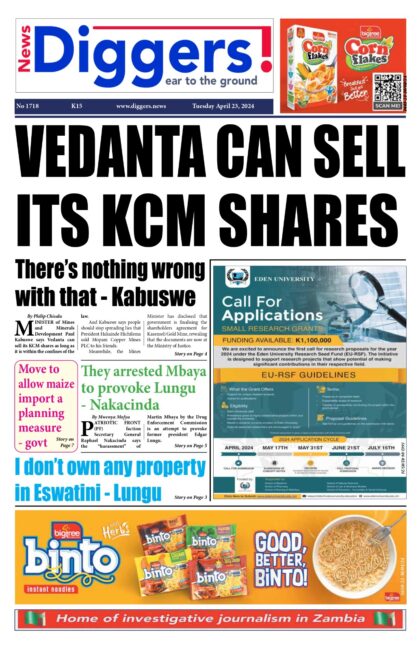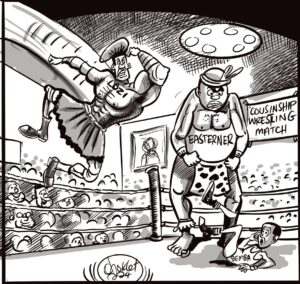Government today, Monday, announced an extra charge on all Internet calls such as WhatsApp, in a move Cabinet believes will save jobs at the mobile telecommunication companies.
In Zambia Internet calls are already billed according to bundle usage by Data Service Providers which include Artel, MTN and Zamtel, among others.
According to a Statement released by Chief Government Spokesperson Dora Siliya, through her director Isaac Chipampe, the decision was arrived at today during Cabinet meeting State House .
“Government has noted an increase in the use of internet phone calls at the expense of traditional phone calls. This development threatens the telecommunications industry and jobs in companies such as Zamtel, Airtel and MTN.
Government has, therefore, introduced a 30 Ngwee a day tariff on internet phone calls. Cabinet has since approved the issuance of a Statutory Instrument (SI) that will facilitate the introduction of the tariff to be charged through mobile phone operators and internet providers. Research shows that 80 per cent of the citizens are using WhatsApp, skype, and Viber to make phone calls,” read the statement in part.
Cabinet also approved the Internet regulation Bill, 2018.
“Cabinet further approved in principle, the introduction of the Cyber Security and Cyber Crimes Bill that will repeal and replace certain parts, clauses and sections contained in the Electronic Communications and Transactions Act No. 21 of 2009. The Bill will promote an increased cybersecurity posture; facilitate intelligence gathering, investigation, prosecution and judicial processes in respect of preventing and addressing cybercrime, cyber terrorism and cyber warfare against the sovereign Republic of Zambia,” read the Statement in part.
“The Bill will authorise the taking of measures to ensure cyber security in Zambia, facilitate the establishment of the Zambia National Cyber Security Agency (ZNCSA) that will serve as the highest coordination centre for all matters related to cybersecurity at national and international levels. The Bill will also criminalise computer-based offences and network-related crime in line with the Penal Code of the Republic of Zambia. The Bill will further provide for investigation and collection of evidence for computer and network related crime and also provide for the admission of electronic evidence for such offences. The Act will adequately deal with various crimes committed using social media platform targeting different consumer groups in the country.”
Below is the full statement:
(This Document is the Property of the Government of the Republic of Zambia)
PRESS STATEMENT BY THE CHIEF GOVERNMENT SPOKESPERSON ON THE DECISIONS MADE BY CABINET AT THE 12TH CABINET MEETING HELD AT STATE HOUSE ON MONDAY, 12TH AUGUST, 2018
At the 12th Cabinet Meeting held today at State House, chaired by His Excellency the President Mr. Edgar Chagwa Lungu three (3) substantive Items were discussed as the Patriotic Front Government continues to provide its policy direction aimed at improving the general living standards of the people through improved service delivery.
1. Tariff on internet phone calls
Government has noted an increase in the use of internet phone calls at the expense of traditional phone calls. This development threatens the telecommunications industry and jobs in companies such as Zamtel, Airtel and MTN.
Government has, therefore, introduced a 30 Ngwee a day tariff on internet phone calls.
Cabinet has since approved the issuance of a Statutory Instrument (SI) that will facilitate the introduction of the tariff to be charged through mobile phone operators and internet providers.a
Research shows that 80 per cent of the citizens are using WhatsApp, skype, and Viber to make phone calls.
2. The Food Reserve (Amendment) Bill, 2018
During the same Meeting, cabinet approved in principle, the introduction of a Bill in Parliament to amend the Food Reserve Act, Cap. 225 of 1995 in order to strengthen the operations of the Food Reserve Agency and enable it to operate sustainably with reduced dependence on Government funding by inclusion of provisions related to the following:
(a) amend the definition of national strategic food reserves to make it more encompassing by defining national strategic food reserves as, “Designated commodities as shall be sufficient to cover for lean periods taking into account consumption levels, national population, period required to mobilise resources, lead importation period and other related factors”;
(b) designate Food Reserve Agency (FRA) storage sites as restricted areas and provide penalties for interference in the strategic food reserves as provided by relevant pieces of legislation such as Cap. 125, The Protected Places and Areas Act; and;
(c) amend provisions related to finance and corporate governance, including the composition of the Board. This entails aligning the FRA financial year to the national budget cycle i.e. the financial year should start in January and end in December as opposed to the financial year beginning in March and ending in February. In addition, the financial provisions of the Act should be amended to allow the FRA retain a proportion of the revenue generated from the sale of designated commodities. Further, provisions related to the composition of the Board should be amended to reflect the changes in the Ministries i.e. to include provisions for participation from the Ministry of Fisheries and Livestock.
At its creation in 1996, FRA inherited various Government owned storage facilities comprising grain sheds, silos and hard standing slabs some of which are dilapidated and require rehabilitation. The Agency has been performing the task of buying produce from farmers every marketing season beginning 1996 todate.
It is in the interest of Government to ensure that FRA is more sustainable in the implementation of its programmes and activities and reduce pressure on the Treasury financially so that some of the resources are targeted towards other needy areas.
3. Cyber Security and Cybercrime Bill, 2018
Cabinet further approved in principle, the introduction of the Cyber Security and Cyber Crimes Bill that will repeal and replace certain parts, clauses and sections contained in the Electronic Communications and Transactions Act No. 21 of 2009. The Bill will promote an increased cybersecurity posture; facilitate intelligence gathering, investigation, prosecution and judicial processes in respect of preventing and addressing cybercrimes, cyber terrorism and cyber warfare against the sovereign Republic of Zambia.
The Bill will authorise the taking of measures to ensure cyber security in Zambia, facilitate the establishment of the Zambia National Cyber Security Agency (ZNCSA) that will serve as the highest coordination centre for all matters related to cybersecurity at national and international levels. The Agency will facilitate the protection of Zambia’s critical infrastructure from cyber-attacks. Reality is dawning upon us that our national critical information infrastructure will always have some degree of vulnerability and requires a dedicated body to protect national interests.
The Bill will also criminalise computer-based offences and network-related crime in line with the Penal Code of the Republic of Zambia. The Bill will further provide for investigation and collection of evidence for computer and network related crime and also provide for the admission of electronic evidence for such offences. The Act will adequately deal with various crimes committed using social media platform targeting different consumer groups in the country.
Publication and Dissemination of the 2017 Annual Economic Report
Cabinet further directed the Minister of Finance to publish and disseminate the 2017 Annual Economic Report to the public.
The key highlights in the 2017 Economic Report include an indication that the global economy continued to recover in 2017, with output estimated at 3.7 percent from 3.2 percent in 2016; preliminary estimates indicate that the domestic economy grew by 4.1 percent in 2017, compared to 3.8 percent in 2016; total revenue and grants amounted to K43.03 billion against a budget projection of K45.34 billion; in line with the lower revenues, expenditures were constrained in 2017 and were below target by 6.3 percent and the preliminary data indicates that the external debt stock at the end of December 2017 increased by 25.8 percent to US$8,738.95 million from US$6,947.1 million in 2016.
The report further highlights policy issues that require attention such as double digit growth is imperative to create jobs and counter the high poverty levels; the need to expedite implementation of revenue enhancing measures such as automation of revenue collection processes; the need to reign in Government borrowing so that we bring the debt to moderate risk from high risk of distress and the need to hasten the policy, structural and legislative reform agenda.












